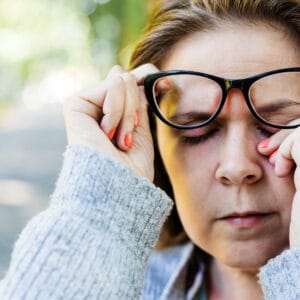December 15, 2023
Going green is something many professionals are doing, including those of us in the optical industry. The concept has become so popular that you’ll find sustainability articles in the news daily. More consumers have become aware of the need for environmental changes, and along with climate change, going green is on almost everyone’s mind. During a recent discussion with several manufacturers at the American Academy of Optometry meeting in New Orleans, it was revealed that they are dedicating time and money to the mission of creating more sustainable products. The eye care and eyewear space is supporting new involvement, and the commitment to evaluate and implement sustainable practices is emerging weekly.1 To track them, Vision Monday recently began the series “Going Green: Sustainability Trends and Tactics for ECPs.”
Survey Shows ECPs Support Green Practices
In a Jobson Research Environmental Sustainability Study for Vision Monday’s sister publication, 20/20 Magazine, conducted just last fall, eye care professionals shared a markedly positive outlook. More than 70% said it was “somewhat or very important” to employ environmentally friendly practices to make their location “green.” I know several practices that have recently begun to make changes to accomplish a “greener” format. The Clayton Eye Center in Morrow, Ga., has begun to seek out vendors who subscribe to making these changes. Dr. James New, an optometrist in Peachtree City, Ga., recently stated, “If I have a choice in suppliers for a similar product, I always choose a company whose mantra is sustainability.”
According to the study, 58% stated that their patients felt it was “somewhat or very” important that their practice did this. Furthermore, 19% said their patients were inquiring or requesting products with ecologically conscious manufacturing, a peak since Jobson started the survey. Mollie Tavel Kaback, director of growth and community engagement for Dr. Tavel Optical Group in Indianapolis, Ind., stated, “We’ve dabbled in sustainable frames and contact lens recycling when they launched it, and we started bringing in Dragon recycled frames in 2020.”2
Dr. Robert Lopanik, in Charleston, S.C., stated, “While sustainability is important to me, I would just as soon not advertise that we are using frames made from recycled materials. Some patients would balk at the notion and question the cost.”
Vendors such as Marchon, Modo, and Tara, just to name a few, are already putting additional focus on sustainable frames and cases. Peter Shaw-McMinn, an optometrist in San Diego, Calif., stated, “We have discussed sustainability and going green with our opticians, and they have bought into the concept as quickly as we did.”
Among the optical companies that have recently steered toward environmental and sustainable causes are the following:
CooperVision achieved LEED (Leadership in Energy and Environmental Design) Gold Certification for its Puerto Rico manufacturing facility. That is where the company produces the MyDay and Biofinity brand contact lenses. It had earned LEED Silver certification in 2022. The jump from silver to gold involves a direct commitment from employees and management alike. LEED certification is a globally-recognized symbol of sustainability achievement, and it is backed by an entire industry of committed organizations and individuals paving the way for market transformation.3 “Operating more sustainably for the benefit of our employees, customers, business, and the planet is a core value of CooperVision,” said Javier E. Pellicer Rodriguez, vice president, Americas Manufacturing Operations, CooperVision.
L’Amy America recently introduced three new styles to its Ben Sherman ophthalmic collection. All Ben Sherman styles are designed in biodegradable and recycled materials, including recyclable stainless steel, bio-based acetate, biodegradable demo lenses, and a case made from 100% post-recycled plastic bottles.
Mykita was awarded Silmo’s 2023 first “Responsible Company” prize. This award recognizes a company’s commitment to social and environmental responsibility. One particularly significant step that Mykita initiated was installing a Corporate Social Responsibility function in 2021, at the director level. It also achieved full circularity with its stainless steel supply in 2022.
Bausch + Lomb announced that its One by One and Biotrue Eye Care recycling programs were recognized as Sustainability Award winners. The Business Intelligence Group awards these commendations in their Sustainability Service of the Year category. Bausch + Lomb was the first company that our Clayton Eye Center used to collect patients’ used contact lens products, back in the early 2000s.
Hilco Vision recently announced that Green Seal awarded its SeeGreen lens and screen cleaning solution with the Green Seal award. That means that OptiPlus powered by SeeGreen is the first and only lens care brand certified by the company.
Hoya announced, in August, a new “One Vision” sustainability program. This program drives the company’s vision and ambition to become a more connected, conscious, and impactful organization. The four pillars of the program include CO2 emission reduction, waste prevention, environmental protection and employee safety and health, and fostering Hoya’s culture of sustainability leadership at all levels.
As far as supply chain offerings go, Eastman, one of the world’s largest plastic producers, has been stepping up its own multi-year efforts to create circular systems for recycling plastics to create “eco-responsible” formulas for recycled acetate. Because of this, eyewear companies are able to bring new material options into their own sustainable production and supply chains.
Multi-location eye care practices are also jumping on the green wave. Both MyEyeDr. and National Vision practices have been carrying sustainable eyewear for several years now.
This is just a small selection of examples of the many eye care and eyewear products and practices that have gone green. Shane Foster, OD, of Athens Eye Care in Athens, Ohio, was quoted as saying, “I think the topic of sustainability continues to gain interest among the public as we see more and more reports about climate change and the future of our global environment.”
Dr. Foster’s comments reflect the attitude of many practitioners today; the majority of people and businesses are interested in lowering the carbon footprint of all activities.
References
1,2 Vision Monday. May 2023, pp. 24-25.
3 LEED website https://www.usgbc.org/leed





